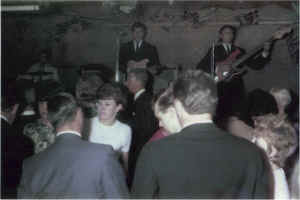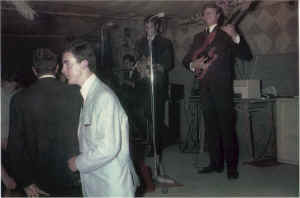During our time on the road with the Regents, Buddy Britten would occasionally speak of his 1963 summer season spent in Jersey in the Channel Islands. Apparently his act had caused much excitement on the island and he had become something of a celebrity, attracting large crowds. At the end of his last show before returning to the mainland, the over-enthusiastic audience had demanded, and got, several encores before the management cut off the band’s electricity supply, resulting in ugly scenes bordering on a riot! This resulted in a ban on the Regents returning to Jersey. 1964, needless to say, was a dire year for music on the island, and apparently a poor time financially for the establishment at which he had appeared, so the offer of a return season for the summer of ’65 was welcomed by all parties!
The thought of returning to the place where my musical career had been conceived was a happy one, for 1960 had started a love for Jersey which still exists to this day, so I had no hesitation in accepting Buddy’s offer of a return to the Regents. Solly, however, had just landed a great gig with the Ivy League, one of England’s biggest acts, so I was amazed when he turned it down to join me in signing the contracts which Buddy swiftly drew up for us. Naturally, the Bergeracs were not too pleased at this development as the group was doing quite well. They wished us well however, and carried on with local boy Charlie Chapman on drums and the great Mick King (late of Cliff Bennett’s Rebel Rousers) on guitar. Sadly they disbanded before the end of 1965 with Cyrano joining Gary Farr and the T-Bones, who featured a talented organist called Keith Emerson. Keith Dyett went to work for Jim Marshall, building amps and speaker cabinets whilst Ray Soper continued to gig with various outfits around his hometown of Putney.
By now I realised that my trusty old Bedford Dormobile, which had carted both the Delta 5 and the Regents up and down the country, was looking rather the worse for wear, so I began to look around for a suitable replacement. My old school pal from the Javelins, Tony Tacon, told me about their Morris J2 van which was up for sale following the collapse of the group. This proved to be in excellent condition, and so was purchased as the next Regents’ bandwagon for the very reasonable sum of 50 pounds.
Early April 1965 saw Solly and I heading out of London towards the docks at Weymouth, where we caught the ferry to Jersey. After arriving at the capital, St. Helier, we made our way to number 14 Raleigh Avenue, where we were welcomed by Mr and Mrs Coker, formerly of Acton, West London, who showed us to the top flat in their comfortable old house which would be our home for the next six months, at the very affordable rent of 6 pounds a week!
With Buddy and his wife Janet not due to arrive for several days, we had instructions to find and introduce ourselves to Buddy’s friend Jimmy Wilson who was a talented singer and guitarist. We soon tracked Jimmy down to his residency at the Goblet Bar, situated in the basement of the Jersey Opera House. A likeable fellow from Belfast, with a sunny personality, he showed us around the island and introduced us to several characters in St. Helier, including one who startled us by appearing, as if by magic, from behind a revolving bookcase and another who offered to supply any bottle of spirits for the small sum of ten shillings (50 pence)! The most entertaining of all was a well to do businessman who loved to play poker and who, when we ran out of money, insisted that we replenish our stake from two plastic washing up bowls, brimming full of cash!
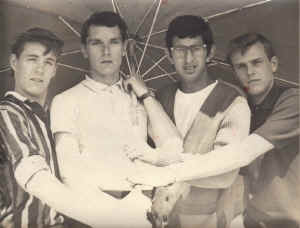
Whilst the island is still a lovely place to go to, visitors will find it very different from the Jersey of 1965. Today the island revolves around the financial industry and there is little live entertainment to be had, but back then Jersey was more famous for its night life. Along the five miles of the west coast alone, there were six or seven night spots. The venue that we were to play at was called the Surf Room, a dance hall cum night club situated on the edge of the beach in the centre of St. Ouens Bay (pronounced ‘wons’), built onto the Watersplash, Jersey’s number one nightspot, where audiences flocked nightly for a meal and a floorshow. Water fountains, cascading over stepped terraces gave the club a somewhat exotic look, which was marred one night when a joker emptied a packet of soap powder into the water, giving the whole area the appearance of a giant meringue!
On the Thursday 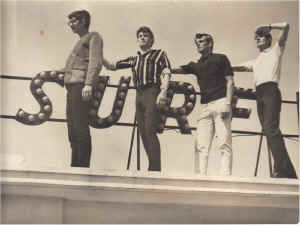 following our arrival we met Buddy at the Surf Room to rehearse. Decked out Hawaiian style with palm trees and garlands, the room had a good stage and lighting, with lively acoustics. As we ran through a few songs to check out the sound, a familiar looking figure wandered around for several minutes, nodding to us, then waving goodbye as he left. It was Dickie Valentine, a huge singing idol of the 1950’s and 60’s, who was appearing a couple of miles up the road. Further along the coast another club played host to singer Danny Williams who was riding high on the back of his huge hit “Moon River”.
following our arrival we met Buddy at the Surf Room to rehearse. Decked out Hawaiian style with palm trees and garlands, the room had a good stage and lighting, with lively acoustics. As we ran through a few songs to check out the sound, a familiar looking figure wandered around for several minutes, nodding to us, then waving goodbye as he left. It was Dickie Valentine, a huge singing idol of the 1950’s and 60’s, who was appearing a couple of miles up the road. Further along the coast another club played host to singer Danny Williams who was riding high on the back of his huge hit “Moon River”.
As Saturday night approached, there was a definite buzz in the air! The island was covered in posters advertising the gig, and we were hoping for a busy opening night. By eight o’clock on Saturday the Surf Room was absolutely packed, and the three of us sat nervously smoking in the dressing room. I tuned my bass, and then Buddy’s Fender Stratocaster as I always used to do. Buddy looked immaculate in a dark blue suit, whilst Solly and I wore matching outfits in Burgundy red. As the crowd grew restless, one wag set up a chant. “Who do we want?” he shouted. “Buddy!!” roared the crowd. “Who’s the greatest?” he cried. “Buddy!!” came the answer. “Who’s a prat?” bellowed someone else. “Buddy!!” they roared once more. By now we were even more nervous. “You two go out first” ordered Buddy, peering out through a crack in the door. Unfortunately, the dressing room was opposite the stage, which meant running through the audience to get there. As fast as we could, Solly and I tore across the room, forcing our way through and climbing onto the stage. The roar from the crowd was deafening, even more so when Buddy arrived close behind us! With no preamble we launched into a driving set of rock ‘n’ roll, ending with three or four encores, before collapsing exhausted in the dressing room.
Everything that Buddy had told us about 1963 was repeating itself for this latest line-up of Regents, and so we embarked on an exciting six months which, for Solly and myself, proved to be our first taste, albeit small, of “fame”. Wherever we went on the island, people would wave and seemed to know our names, so we soon made many friends. On Sunday afternoons all the musicians would gather at a club called The Sands at the north end of St. Ouens Bay for a jam session, where rock and pop musicians would play with jazz players, folk players and lounge musicians, all united in the common cause of making music and entertainment. We also made friends with many seasonal workers, often from Scotland and Ireland, as well as a strong contingent from Spain and Italy. Early in the season the island was rocked by tragedy when an airliner carrying continental workers crashed into a potato field in fog, with only one survivor. A sobering time!
During the day, Solly an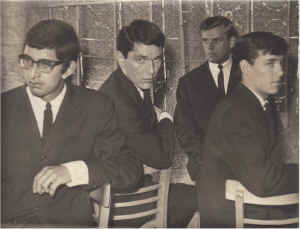 d I would explore the charming capital, St. Helier, or roam the many lanes and beaches. Sometimes we would just hang out with friends, or rehearse new songs whenever Buddy felt like adding to our already huge repertoire. Occasionally one of the Watersplash musicians would cadge a lift from me to visit a sunny meadow where he was attempting to grow his own marijuana. Armed with fertilizer and a watering can, he would visit the spot often. This practice ended abruptly when he found that the meadow was now occupied by a horse that had promptly scoffed his plant, leaving no trace!
d I would explore the charming capital, St. Helier, or roam the many lanes and beaches. Sometimes we would just hang out with friends, or rehearse new songs whenever Buddy felt like adding to our already huge repertoire. Occasionally one of the Watersplash musicians would cadge a lift from me to visit a sunny meadow where he was attempting to grow his own marijuana. Armed with fertilizer and a watering can, he would visit the spot often. This practice ended abruptly when he found that the meadow was now occupied by a horse that had promptly scoffed his plant, leaving no trace!
I guess that life was pretty idyllic at this time. One of the best aspects of Channel Island life was the low cost of living. There were no taxes (apart from a fixed rate of income tax) and items such as alcohol and cigarettes cost very little. Petrol was only half a crown (12½p) a gallon in old money, and it was very difficult to spend more than £15 a week, no matter how extravagant we were. After our gig was finished we often found ourselves invited to parties, particularly by the large surfing contingent who practiced their sport at St. Ouens, one of the best places for surf. In 1965 the Rothmans cigarette company were sponsors of the World Surfing Championship and we became friends with the many U.S. and Australian contestants who frequented the Surf Room at night. Like most young people on the island, t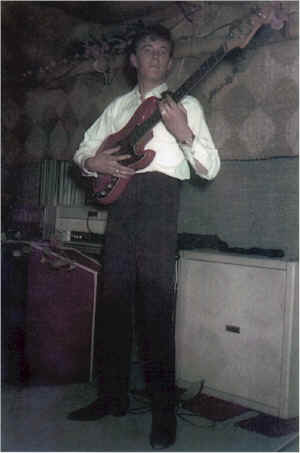 hey were drawn to the parties held in the Second World War underground bunkers which were dotted around the coast. These had been built by the occupying German forces throughout the war years, and some had been decorated out by enthusiastic party lovers, many being hidden in cliff-top locations which were difficult to access. The Jersey authorities had declared these activities illegal, so guards had to be posted on party nights to keep a look out for police raids. The knowledge that we would be deported if caught gave these parties an added air of excitement!!
hey were drawn to the parties held in the Second World War underground bunkers which were dotted around the coast. These had been built by the occupying German forces throughout the war years, and some had been decorated out by enthusiastic party lovers, many being hidden in cliff-top locations which were difficult to access. The Jersey authorities had declared these activities illegal, so guards had to be posted on party nights to keep a look out for police raids. The knowledge that we would be deported if caught gave these parties an added air of excitement!!
As the summer went on, the opening frenzy had settled down, but every week was different, with our audience changing nightly, although our hardcore supporters were always there! There never seemed to be a dull moment. Sometimes customers would get over-excited and be removed by the bouncers. One night the head of security, a huge guy named Jim, tried to eject one of our regulars, a Glasgow lad who had over-imbibed! When Buddy remonstrated from the stage, a slanging match ensued which led to Jim and Buddy squaring up to one another outside. Obviously the slender Buddy was no match for the Hulk-like Jim, but Buddy courageously stood up to him on behalf of our pal, even though Jim was threatening Buddy with instant oblivion! Luckily it occurred to Jim that the whole audience sided with Buddy and would have flung him from the sea wall if he had thrown a punch! Our pal was allowed back in, whilst Jim, defeated by People power, skulked off to the bar!
Early in the season an old acquaintance and fellow musician Roddy Freeman came over for a visit. Roddy had been a big influence on my career, having graduated from skiffle to become a recording artist at the legendary Joe Meek stable before joining the Flintstones with Terry Marshall and Rupert Ross amongst others. Rod admitted that he had regarded me as a young nerd, always hanging around the band, but when he realised that the Flintstones represented an important part of my musical education, his attitude changed and during his week in Jersey, we hung out together. Several times we visited Jimmy Wilson at the Goblet bar, who invited Rod to get up and do his stuff. He was happy to oblige and knock out the audience with his masterful knowledge of music. Accompanying himself on Jimmy’s guitar, he would effortlessly run through an amazing catalogue of sings, ranging from Bill Haley to Johnny Mathis, from Ray Charles to Nat King Cole, his jazzy vocals drawing loud applause from the crowd. By the time I drove Roddy to the airport at the end of his holiday we had forged a great rapport, and he was to become one of my closest friends.
Halfway through the season we took time out to fly back to the mainland to record four songs in the Pye studios at Marble Arch, London, for the next Regents’ record releases. Buddy insisted that Solly and I paid our own air fares as, he reminded us, we were “on royalties”. No statement ever arrived from Pye, however, so I wrote requesting one the following year, but never received a reply!! Back in England we were met at Jim Marshall’s shop by our good friend Paul Tait who had a light van with which to ferry equipment to the studio. I had previously telephoned Jim requesting the loan of amplifiers, and true to form he refused all offers of payment for his services.
Reunited with pianist Tony Richards and Buddy’s brother Nigel on tambourine, we swiftly recorded the four songs for Pye records with producer John Schroeder in charge. John, famous for writing and producing a string of hits for Helen Shapiro, was a laidback producer who soon put us at ease. For me and Solly this was our baptism into the world of making records, although I had previously made a demo with Some Other Guys. In one afternoon session we completed two ‘A’ sides and two ‘B’ sides, a feat which was not unusual at the time, but probably impossible today. As we beavered away at Marble Arch I could not have imagined that I would be back in the same studio in less than three years’ time with a new group named Deep Purple!
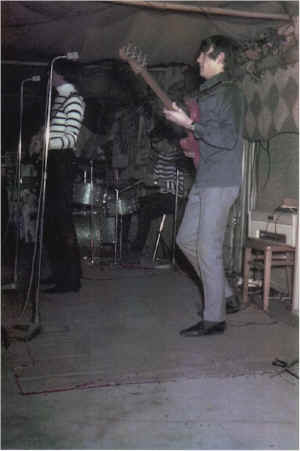 Shortly after our return to Jersey we were notified of the imminent release of our single, a cover of the U.S. hit by the Sir Douglas Quintet called “She’s About A Mover”. Unfortunately, Pye had been a bit too slow, and the original version was released on the very same day, thus eclipsing our version completely! To
Shortly after our return to Jersey we were notified of the imminent release of our single, a cover of the U.S. hit by the Sir Douglas Quintet called “She’s About A Mover”. Unfortunately, Pye had been a bit too slow, and the original version was released on the very same day, thus eclipsing our version completely! To make matters worse another cover of the song was simultaneously released by one of England’s greatest rock singers, James Royal. Now, as James Royal (better known as Jimmy) was a good friend of both Solly and myself, we found ourselves accused by Buddy of tipping off Jimmy about the song. Of course his accusation was totally unfounded and it was just a surprising coincidence. Anyway the result was that both cover versions were completely buried by the original! To be honest I did not think that our version was as good as Sir Douglas’, but backed with an excellent original written by Buddy, called “Since You’ve Gone”, it wasn’t a bad record and I was quite proud of my first release!
make matters worse another cover of the song was simultaneously released by one of England’s greatest rock singers, James Royal. Now, as James Royal (better known as Jimmy) was a good friend of both Solly and myself, we found ourselves accused by Buddy of tipping off Jimmy about the song. Of course his accusation was totally unfounded and it was just a surprising coincidence. Anyway the result was that both cover versions were completely buried by the original! To be honest I did not think that our version was as good as Sir Douglas’, but backed with an excellent original written by Buddy, called “Since You’ve Gone”, it wasn’t a bad record and I was quite proud of my first release!
Shortly after, Pye released our follow-up, a cover of a song originally recorded by Mel Tormé, entitled “Right Now”. Backed with the old folk standard “Jailer Bring Me Water”, Right Now was a slightly jazzy up-tempo tune which got great reviews and proved popular with audiences, but failed to make the charts.
1965 was one of the best years for music, with many different types of song charting, including such diverse acts as Sonny and Cher, Righteous Brothers, Unit 4+2, Yardbirds and the Ivy League. Occasionally Buddy would include some of the more unusual hits in our act as crowd pleasers, such as “The Clapping Song” by Shirley Ellis, “Everybody” by Tommy Roe, and “King Of The Road” by Roger Miller. We also included the Everly Brothers’ “Price Of Love” in our show, which I was particularly proud of. In spite of my limited vocal ability, Buddy wanted me to sing harmony wherever possible, and it was working rather well, although a bad case of tonsillitis in late August was a taste of trouble to come!
As the season continued, Solly and I were unaware of the cracks appearing in Buddy’s marriage. Buddy and his wife were renting a cottage in the countryside which was the venue for many riotous parties. One Saturday night after the show, Buddy made it plain that he was in no mood to party, in spite of many people having been invited back to his house, and without a word he went straight to bed. His wife Janet, however, had decided that the party would go ahead, leading to clash of wills when Buddy emerged from his bed to try and sabotage the record player! This seemed to be the final straw and before long Janet had departed for the mainland. The effect on Buddy was quite dramatic! He seemed to enjoy being a bachelor once more, taking on the persona of a rock star cum playboy. I moved into his home for several weeks to keep him company whilst he hatched new plans. There was no doubt that the music scene was changing, with the emphasis being on groups rather than solo artists, so Buddy summoned us to a meeting in a top restaurant to outline his new ideas. After the Jersey trip was over, the name Buddy Britten and the Regents would be no more, he solemnly informed us. He was to become Simon Raven (also the name of a best-selling author) and the band members would also have new identities. Solly was to be called Roger Truth (the name he uses to this day), Tony Richards would be christened Richard Honour, and I was to be known as Kid Freedom! Truth, Freedom, Honour! Collectively we would be known as the Simon Raven Cult. The suits were to be dispensed with, dress would be pop art style and the music would be louder and more aggressive. Buddy had put his ideas to us with his usual persuasive charm, and Solly and I were impressed to say the least!
As the season in Jersey ended, we both knew that this had been one of the happiest and most memorable periods in our short careers. We also knew that six months of playing together nightly had melded us into a useful rhythm section, ready to take on the world! Buoyed up with Buddy’s new ideas, we were a happy pair as we left Jersey to return to England again….


